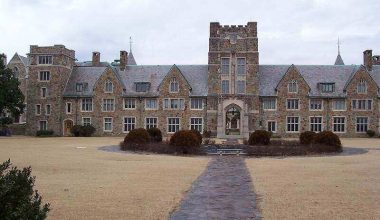Are you curious about what a Quaker School is? You’ve come to the right place! This article will fully explain a Quaker School, including some Frequently Asked Questions.
A Quaker School is an educational institution that adheres to Quaker values, principles, and practices. It aims to foster students’ spiritual, intellectual, emotional, and physical growth.
Quaker Schools have a long history from the 17th century when Quaker settlers established schools to educate their children in Quaker principles.
Read on as we learn more about Quaker schools.
Table of contents
- What are Quaker Values and Principles?
- What is the Teaching Philosophy of Quaker Schools?
- What is the Role of Religion in Quaker Schools?
- What is the Student Body Like in a Quaker School?
- What Extracurricular Activities are Available in Quaker Schools?
- What is the Teacher-Student Relationship Like in Quaker Schools?
- What is the Admissions Process for Quaker Schools?
- What are Some Examples of Quaker Schools?
- What are the Benefits of Attending a Quaker School?
- FAQs
- Conclusion
- References
- Recommendations
What are Quaker Values and Principles?
Quaker values and principles are at the core of the education provided in Quaker Schools.
These values are grounded in the belief that every person has inherent worth and dignity, emphasizing the importance of community, equality, and social responsibility.
#1. Simplicity
This value emphasizes the importance of living a simple and uncluttered life, free from material possessions and unnecessary distractions.
Quaker Schools also seek to instill this value in their students by promoting mindfulness, encouraging them to focus on what is truly important, and teaching them to live sustainably.
#2. Peace
Quakers also believe in the power of non-violent conflict resolution and seek to promote peaceful solutions to problems.
These schools emphasize peaceful conflict resolution through restorative justice practices, conflict resolution programs, and peer mediation.
#3. Integrity
This value emphasizes the importance of honesty, transparency, and ethical behavior.
These schools teach students to live with integrity by modeling ethical behavior, teaching students about the consequences of dishonesty, and encouraging them to take responsibility for their actions.
See Also: Best Christian schools in Seattle 2023 | University, High School
#4. Community
Quaker Schools emphasize the importance of building strong, inclusive communities that value and respect everyone.
They promote inclusivity, diversity, and equity through various programs and initiatives, such as cultural celebrations, diversity training, and community service projects.
#5. Equality
Quakers believe that all people are equal and deserve equal opportunities, regardless of race, gender, sexuality, or background.
These schools teach students to value equality by promoting diversity and inclusivity and encouraging them to challenge discrimination and prejudice.
#6. Stewardship
Quaker Schools also teach students to be responsible stewards of the earth by promoting sustainable living practices.
Hence, they encourage students to participate in environmental initiatives, teaching them about the interconnectedness of all living things.
See Also: In What Country Is It Easiest to Become a Doctor?
What is the Teaching Philosophy of Quaker Schools?
The teaching philosophy of Quaker Schools is rooted in the Quaker values and principles of community, equality, social responsibility, simplicity, peace, and integrity.
These schools believe in nurturing the whole child, focusing on their intellectual, emotional, and spiritual development.
The Quaker teaching philosophy emphasizes experiential and inquiry-based learning, encouraging students to explore their interests and develop their understanding of the world around them.
They encourage students to think critically, ask questions, and engage in meaningful discussions inside and outside the classroom.
These schools also strongly emphasize collaborative learning, where students work together to solve problems and share their knowledge and ideas.
This approach to learning fosters a sense of community and encourages students to value each other’s perspectives and opinions.
Another important aspect of the Quaker teaching philosophy is the belief in every person’s inherent worth and dignity.
They reflect this belief in how Quaker Schools approach discipline, seeking to promote restorative justice practices and address behavior issues in a way that respects the dignity of each student.
These schools also believe in the importance of service learning and social responsibility.
They encourage students to engage in service projects and volunteer work locally and globally to impact their communities and the world positively.
See Also: What Is A Continuation School? (What I Should Understand)
What is the Role of Religion in Quaker Schools?
Religion is significant in Quaker Schools, founded on the Quaker faith.
However, these schools are welcoming and inclusive of students from all religious backgrounds, and they do not require students to be Quakers or adhere to any particular religious beliefs.
The Quaker faith is based on the belief in the inner light, the idea that everyone has a divine spark within them.
This belief is reflected in how these schools approach education, focusing on developing the whole child and nurturing their spiritual growth.
While Quaker Schools do not require students to be Quakers, they offer opportunities for students to participate in Quaker worship and explore their spirituality.
Students may attend weekly meetings for worship, where they can reflect, meditate, and share their thoughts and feelings with the community. These meetings are often conducted in silence, allowing students to connect with their inner selves and the divine.
In addition to weekly meetings for worship, these schools may offer religious education classes. This is where students can learn about Quaker beliefs and practices, as well as the beliefs and practices of other religions.
These classes promote understanding, respect, and tolerance for different beliefs and perspectives.
The role of religion in Quaker Schools extends beyond the classroom, as they integrate the values and principles of the Quaker faith into every aspect of school life.
These values include community, equality, social responsibility, simplicity, peace, and integrity, and they are reflected in how students interact with each other, the staff, and the wider community.
Check Out: What is Apologetics Study Bible? (Explained With FAQs)
What is the Student Body Like in a Quaker School?
The student body in a Quaker School is diverse and inclusive, reflecting the Quaker values of equality and social responsibility.
These schools welcome students from all backgrounds and cultures and strive to create a supportive and nurturing community.
Quaker Schools typically have smaller class sizes, which allows for more individual attention and personalized instruction.
This also creates a sense of community and intimacy among the students and staff. They encourage students to participate actively in their education and teach them to take responsibility for their learning.
In these schools, students must be respectful, empathetic, and compassionate towards others.
The Quaker values of peace, integrity, and equality are woven into the fabric of school life, and students are encouraged to live these values in and out of the classroom.
These schools also emphasize the importance of service and social responsibility. They encourage students to give back to their communities and work towards improving the world.
This may include community service projects, service-learning opportunities, or other forms of activism and engagement.
One of the unique features of these schools is their commitment to consensus decision-making. They encourage students to participate in decision-making and work collaboratively with their peers and teachers to solve problems.
This promotes a sense of community and shared responsibility and helps develop important leadership and communication skills.
See Also: 13 Best Summer Boarding Schools | 2023 Rankings
What Extracurricular Activities are Available in Quaker Schools?
Quaker Schools offer various extracurricular activities catering to their students’ diverse interests and talents.
These activities allow students to explore their passions, develop new skills, and build strong relationships with their peers.
These schools’ most popular extracurricular activities include sports teams, music and arts programs, clubs and organizations, and community service projects.
Students can participate in various sports, including basketball, soccer, volleyball, and swimming. These sports teams allow students to develop their athletic abilities, work together, and learn important life skills such as perseverance, sportsmanship, and leadership.
Music and arts programs in these schools allow students to express themselves creatively and explore their artistic talents.
Students can participate in choirs, orchestras, bands, and theater productions, among other activities. These programs help to develop student’s creativity, self-expression, and confidence.
Clubs and organizations in Quaker Schools allow students to connect with others who share their interests and passions. There are clubs for everything from the debate and public speaking to robotics and environmental activism.
These clubs allow students to learn new skills, build friendships, and positively impact their communities.
Community service projects are also an important part of extracurricular activities in Quaker Schools.
They encourage students to give back to their communities and to make a difference in the world. They can participate in service-learning projects, volunteer at local organizations, or organize service projects.
These activities help students to develop empathy, compassion, and a sense of social responsibility.
Check Out: 10 Best Performing Arts Boarding Schools In USA | 2023
What is the Teacher-Student Relationship Like in Quaker Schools?
The teacher-student relationship is a crucial aspect of education and an area where Quaker schools excel.
In a Quaker school, the teacher-student relationship is built on mutual respect, trust, and a commitment to the student’s well-being.
These schools have a strong sense of community and encourage teachers to form meaningful relationships with their students. This allows teachers to understand each student’s unique learning style, strengths, and challenges and to tailor their teaching approach accordingly.
One of the key principles of Quaker education is the belief that every student has the potential to succeed and that it is the teacher’s responsibility to help unlock that potential.
Quaker teachers are trained to be supportive, encouraging, and compassionate and to create a safe and nurturing environment for their students.
Another important aspect of the teacher-student relationship in these schools is the emphasis on collaboration and cooperation.
These schools believe that education is a joint effort between the teacher and the student and that students learn best when actively engaged in the learning process. Teachers encourage students to ask questions, share their ideas, and participate in group discussions and projects.
These schools also prioritize experiential learning involving hands-on, interactive learning experiences.
This approach encourages students to take an active role in their learning and helps them to develop critical thinking, problem-solving, and decision-making skills.
See Also: Top 10 Public High Schools in Chicago
What is the Admissions Process for Quaker Schools?
Quaker schools have a unique admissions process focused on building a diverse and inclusive community. The process varies from school to school but generally involves several steps to ensure that the student fits the school’s values and mission well.
However, the first admissions process step is attending an open house or a virtual information session. This is an opportunity for prospective students and their families to learn more about the school’s values, mission, and programs.
The open house may include the following:
- A campus tour.
- A meeting with the admissions team.
- A chance to speak with current students and faculty.
Once the family has attended an open house, the next step is to complete an application. The application typically includes a student essay, transcripts, teacher recommendations, and standardized test scores. Some schools also require an interview with the student or parents.
After submitting the application, the admissions committee will review it and decide whether to invite the student for an on-campus visit.
During the on-campus visit, the student can attend classes, meet with teachers and students, and participate in extracurricular activities.
Finally, the admissions committee will decide whether to admit the student.
The family will receive an acceptance letter and enrollment information if the student is accepted.
If the student is not accepted, the family will receive a letter explaining the reasons for the decision.
Check Out: 10 Best Boarding Schools In Maryland Boys & Girls | 2023 Rankings
What are Some Examples of Quaker Schools?
Quaker schools are located in different parts of the world and vary in size and focus.
However, here are some examples of Quaker schools:
1. Friends Select School – Located in Philadelphia, Pennsylvania, Friends Select School was founded in 1833 and has an academic excellence history. We know the school for its rigorous curriculum, diverse student body, and commitment to social justice.
2. Sidwell Friends School – Sidwell Friends School is located in Washington, D.C., and was founded in 1883. The school has a strong emphasis on community service and social justice. The school has a diverse student body, and alums include the children of several U.S. Presidents.
3. George School – In Newtown, Pennsylvania, George School is a coeducational boarding and day school founded in 1893. The school has a strong commitment to sustainability and environmental stewardship. The school’s motto is “Mind the Light,” which reflects its Quaker values.
4. Friends School of Baltimore – Founded in 1784, Friends School of Baltimore is the oldest Quaker school in the United States. The school strongly focuses on community service and social justice, and its curriculum emphasizes developing critical thinking skills.
5. Oakwood Friends School – Located in Poughkeepsie, New York, Oakwood Friends School is a small, coeducational Quaker school founded in 1796. The school strongly commits to social justice and sustainability, and its curriculum emphasizes experiential learning.
See Also: Best Christian Schools In Maryland 2023 | University, High School
What are the Benefits of Attending a Quaker School?
Attending a Quaker school has several benefits, making it a compelling choice for parents and students.
Below are some of the advantages of attending a Quaker school.
- Emphasis on Values and Character Development
- Excellent Academics
- Small Class Sizes
- Inclusive Community
- Focus on Service and Social Responsibility
- Strong Sense of Community
- Opportunities for Spiritual Growth
- Emphasis on Peace and Conflict Resolution
- Preparation for Life
Check Out: 10 Best Undergraduate Business Schools in the World | 2023
FAQs
Quaker schools offer a range of extracurricular activities, including athletics, arts, community service, and leadership programs.
Yes, Quaker schools offer education from pre-kindergarten through high school.
The student-teacher ratio at Quaker schools is often low, allowing for individualized attention and support.
Conclusion
A Quaker School is an educational institution that values Quaker principles, such as simplicity, peace, integrity, community, equality, and stewardship.
These schools also strive to provide a supportive and inclusive community that fosters each student’s intellectual, emotional, and spiritual growth.
If you’re interested in attending a Quaker School, we encourage you to explore your options and learn more about this unique educational tradition.



